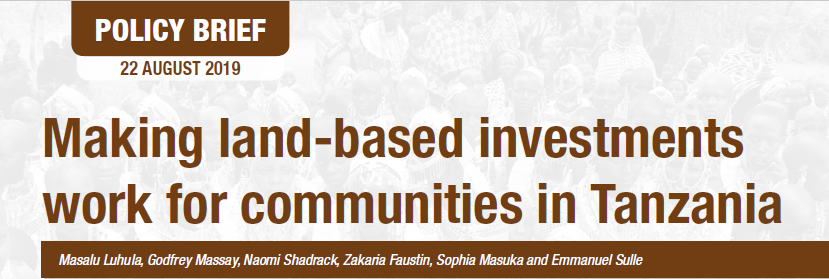Community-based Payments for Ecological Services: From Potential to Practice - Operationalizing Initiatives in Tanzania
Background
During the past year there has been continually growing interest in the potential for payments for ecosystem services (PES) as a way to contribute to rural development and biodiversity conservation aims in Tanzania, as well as to contribute to global efforts to address climate change. Local development and conservation organizations are increasingly exploring ways to develop PES initiatives, and development partners are devoting significant resources to these approaches, while Tanzanian government agencies begin to integrate PES approaches with sectoral policies. During the past year, for example, the Norwegian government has made a major commitment to funding REDD activities in Tanzania, while the global Katoomba Group held a well-attended conference on PES in Dar es Salaam to encourage wider experimentation with and understanding of these approaches.

The Bunduki Gap - Photo Credit: T.Blomley
TNRF has supported a number of member organizations pursuing PES approaches to establish a Carbon-Forestry working group as a sub-group of the Forestry Working Group. This sub-group held a roundtable meeting to discuss PES concepts and application to community-based forest conservation projects linked to the voluntary carbon market, which a number of companies and NGO's have begun to develop.
At present, PES approaches are generating widespread interest and enthusiasm as to their potential, but there remains limited practical experience with operationalizing these kinds of ventures. In attempting to move from promoting the potential of PES approaches to putting these initiatives into practice, a range of operational questions and complexities emerge which now must be addressed in order to make greater progress on the ground.
Such questions include:
• How can PES initiatives be structured as partnerships between different actors such as NGO's, private companies, local communities, government, and development partners?
• How can PES initiatives operationally integrate economic development, biodiversity conservation, and business objectives?
• How are PES initiatives being negotiated and structured in relation to village government institutions with authority over village lands?
• How can PES initiatives most effectively create collective local incentives for biodiversity or forest conservation?
• How can PES initiatives achieve financial sustainability, either as for-profit or non-profit undertakings?
• How are PES initiatives being funded and capitalized?
• How are PES initiatives addressing, in their operational models, core concerns with additionality, leakage, and permanence?
• How can emerging PES initiatives be scaled up?
Although most PES initiatives in Tanzania remain relatively nascent, there are enough emerging ventures on the ground to begin to address these core operational questions with a significant degree of detail. Organizing collective discussion of these issues amongst interested parties at this early stage is advantageous in that it will enable practitioners to share ideas and adapt their operational strategies based on feedback received. This process of information-sharing and dissemination of ideas is the core function of TNRF's Carbon-Forestry working group. It is therefore proposed that this group convene a one-day workshop to discuss operational aspects of PES initiatives, based on presentations delivered by those initiatives which have reached the stage of project implementation and thus begun to address the above set of questions in some detail. Holding such a discussion at this stage will help focus the development of PES initiatives in Tanzania and orient these initiatives towards the practical aspects which will ultimately determine the impact and effectiveness of these new and promising, yet largely untested, approaches to conservation and rural development.
Provisional Agenda
The workshop will consist of the following presentations, with details and precise timetable to be confirmed shortly.
• TBD, Tanzania Natural Resource Forum. Progress and Challenges in Developing PES Initiatives in Tanzania for Improved Natural Resource Governance
• Simon Milledge, Royal Norwegian Embassy. Conceptual and Practical Challenges in the Operationalization of REDD in Tanzania.
• Charles Foley, Wildlife Conservation Society. Putting PES into Practice in Northern Tanzania's Simanjiro Plains, 2004-2009.
• Selemani Kinyunyu, Offset Africa. Entering the Voluntary Carbon Market: A Tanzanian Private Sector Perspective.
• Fred Nelson and Marc Baker, Carbon Tanzania. Developing Community-based Forest Conservation Carbon Offset Projects: Initial Models and Experiences
• TBD, Tanzania Forest Conservation Group. A Community-based Cooperative Model for Forest Offset Projects.
• TBD, CARE-Tanzania. Operationalizing Payments for Water Services in the Uluguru Mountains.

